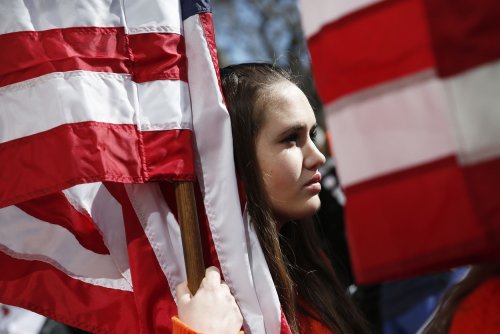WASHINGTON, July 9 (UPI) -- Since the 1990-1991 unraveling of communism in Eastern Europe and Eurasia, countries liberated from socialist state planning have sought to convert their centrally planned economies into market ones, with varying degrees of success. To assist in the process they often have sought Western advice, but such assistance often has come at a high social price, as free market "shock therapy" frequently impacts the poorest elements of society, which in turn can lead to social unrest.
The latest country to demonstrate that Western economic advice can exacerbate social tensions is Mongolia, which on June 29 held its fifth election to the Great State Hural (Parliament) since the country abandoned its communist socialist political system in 1990.
As inflation in Mongolia last year reached 15.1 percent and soared to 17.1 percent between January and June, voters considered the economy to be the main issue, ahead of even unemployment, estimated at above 6 percent, and corruption, widely perceived as endemic.
The elections, perceived by opposition parties as fraudulent, led to protests in the capital, Ulaanbaatar, which turned violent on the evening of July 1, resulting in the country's first state of emergency. The state-owned Montsame news agency reported that a curfew was imposed in the capital and that five people died during the disturbances, 300 were injured and 728 demonstrators were detained. Police used tear gas, rubber bullets and water cannon to force stone-throwing protesters back, and Justice Minister Munkhorgil announced, "Police will use necessary force to crack down on criminals who are looting private and government property" and then acknowledged that live ammunition might have been fired by the police to quell the violence.
So in the wake of the unrest, what advice is the Mongolian government getting from its foreign advisers? According to a Montsame report dated July 4, the U.S. Agency for International Development "has concluded that prices and tariffs of households, entities, companies and organizations for energy are 30 to 52 percent lower than the international average," a conclusion also supported by both the World Bank and the Asian Development Bank. Accordingly, Mongolia's Energy Regulatory Authority decided to raise electricity and heating prices from July 15.
USAID states, "U.S. foreign assistance has always had the twofold purpose of furthering America's foreign policy interests in expanding democracy and free markets while improving the lives of the citizens of the developing world." On Mongolia, in particular, the USAID Web site says: "Mongolia provides an important example to others in East and Central Asia, as well as other parts of the region, on how to manage an economic transition from a centrally planned to a free market economy within a democratic political framework. The United States values Mongolia's contribution to stability in a potentially volatile part of the world, its positive example in promoting economic reform and democracy, and its visible support for the war on terrorism," before adding, "USAID promotes private sector-led economic growth in Mongolia by supporting legal and regulatory reforms that are conducive to private investment and enterprise development at the sector and firm level."
If the devil is in the fine print, the USAID Web site adds, almost as an afterthought, "In spite of impressive macroeconomic performance in recent years, Mongolia's poverty rate remains high at 33 percent." Thoughtful observers might well wonder where the one in three poverty-stricken Mongolians living in a country that has what the Library of Congress describes as a "severe continental climate" are going to find the extra money to pay their electrical and heating bills.
The sad reality is that Mongolia's post-communist development has left many citizens behind while enriching a few. In 2006 the World Bank calculated Mongolia's Gross National Income per capita at $690, placing Mongolia No. 130 out of 178 surveyed nations. A third of the population lives in the capital, Ulaanbaatar, while around 40 percent of the population still herds livestock on Mongolia's extensive steppe, which for the last decade has suffered from drought. According to government statistics, a third of the population struggles to survive on $2 a day.
While Mongolia is currently an impoverished nation, it will not remain so for long, given the country's vast mineralogical wealth of copper, coal, gold, molybdenum, fluorspar, uranium, tin and tungsten deposits. For months the country has been wrestling with amendments to its Mineral Law, which will determine foreign investment -- once the law is passed, Mongolia will see an explosion of foreign investment. To give but one example, the Oyu Tolgoi ("Turquoise Hill") copper and gold project in the Gobi region, which Canada's Ivanhoe Mines Ltd. is seeking to develop, the company estimates alone would boost the economy by 33 percent, as over a 35-year mine life span Oyu Tolgoi could produce an average of 440,000 tons of copper and 320,000 ounces of gold annually.
The country's mineralogical resources became an issue during the campaign, with the opposition Democratic Party promising each Mongolian a 1 million togrogs ($884) "share of treasure," an offer that the ruling Mongolian Peoples Revolutionary Party subsequently topped by promising each Mongolian a "country's profit" 1.5 million togrogs ($1,296) grant.
Disinterested political observers might note that in May 2006, protesters in Ulaanbaatar burned an effigy of Ivanhoe owner Robert Friedland and that beginning in 2007, protests in Ulaanbaatar's Sukhbaatar Square have become a daily occurrence. Nor are Mongolians solely concerned about rising energy costs; after bread prices rose 50 percent in April alone, 20,000 Mongolians demonstrated in the capital over rising food costs.
The government is now faced with a stark but simple choice -- to listen to foreign capitalist financial advisory entities and raise prices, risking further social unrest, or to listen to the electorate, which made its unhappiness evident in the July 1 disturbances in the capital.
As one U.S. presidential candidate said 16 years ago, tapping into voter unrest that eventually landed him in the White House, "It's the economy, stupid."














